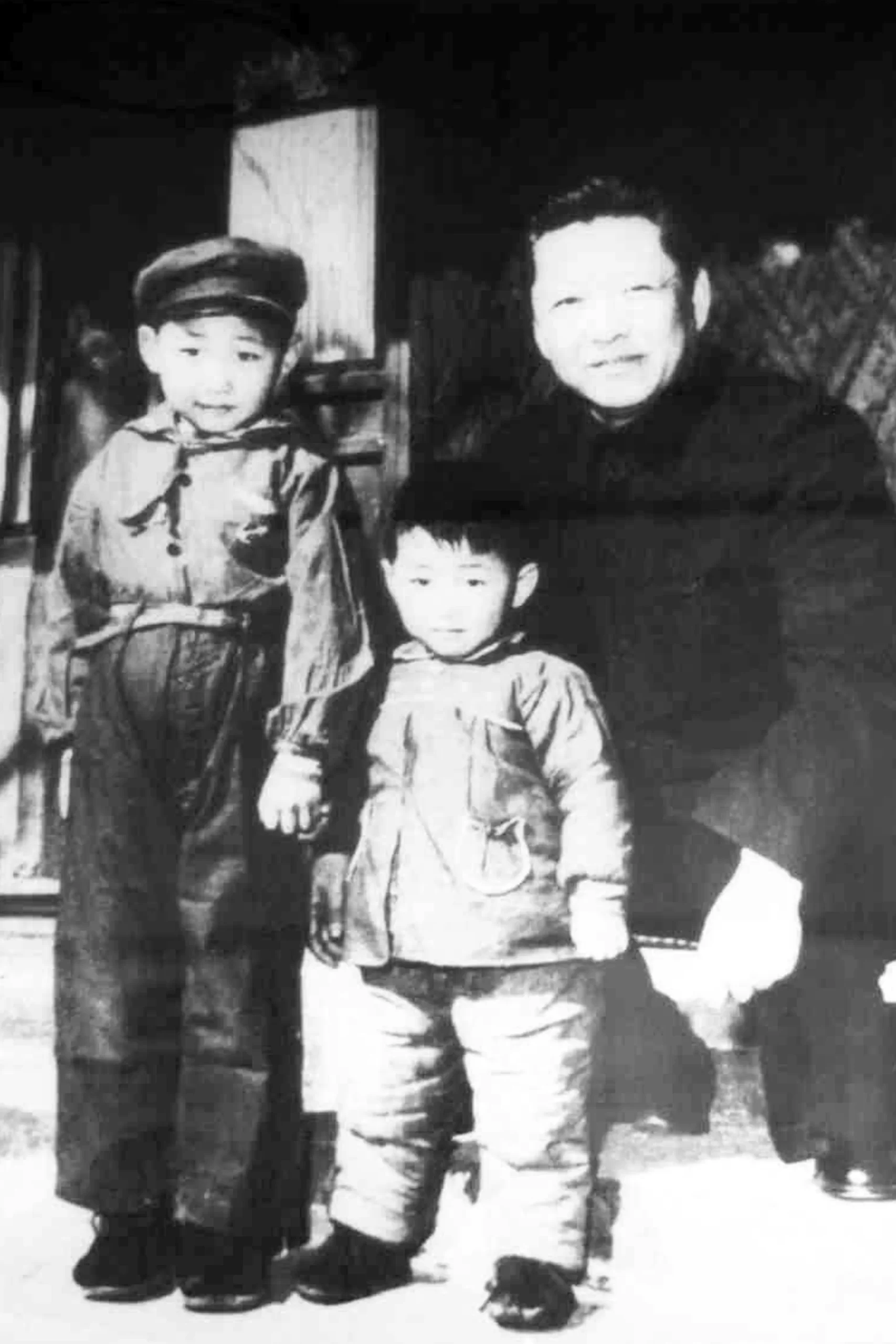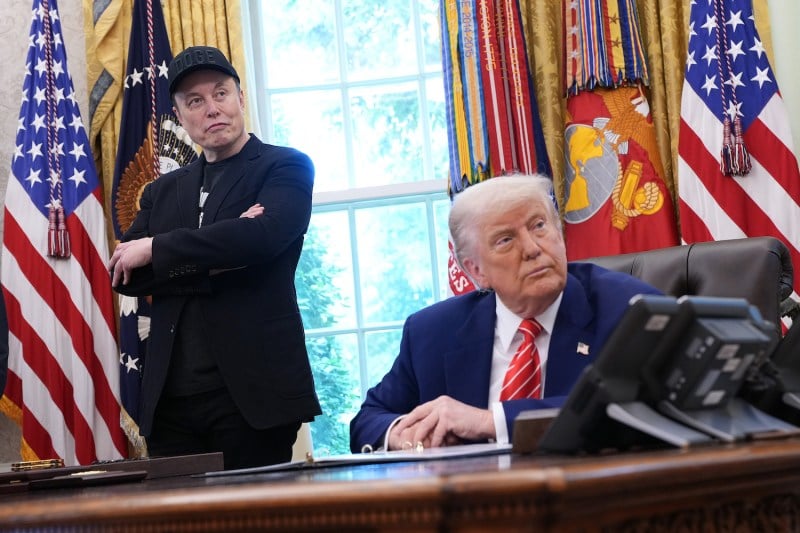Xi Jinping’s Family Fortunes

Xi Jinping (left) with his father, Xi Zhongxun, in 1958. Pictures from History/Universal Images Group via Getty Images
Review
Xi Jinping’s Family Fortunes
A new biography explores the tangled politics of a revolutionary father.
The primary reason most people will pick up a biography of veteran Chinese revolutionary Xi Zhongxun is that his eighth child, Xi Jinping, is the most powerful man in China today.
That’s too bad, because the eventful life of Xi Zhongxun (1913-2002) spanned the messy formative decades of the Chinese Communist Party and is fascinating in its own right. A product of the bloody land revolution that swept rural China in the 1920s, he was the chief lieutenant of a dynamic, pro-Soviet guerilla named Gao Gang, whom Mao Zedong might have anointed as heir—if that man hadn’t been purged and air-brushed from history in the early 1950s.
The primary reason most people will pick up a biography of veteran Chinese revolutionary Xi Zhongxun is that his eighth child, Xi Jinping, is the most powerful man in China today.
The Party’s Interests Come First: The Life of Xi Zhongxun, Father of Xi Jinping, Joseph Torigian, Stanford University Press, 718 pp., $50, June 2025.
That’s too bad, because the eventful life of Xi Zhongxun (1913-2002) spanned the messy formative decades of the Chinese Communist Party and is fascinating in its own right. A product of the bloody land revolution that swept rural China in the 1920s, he was the chief lieutenant of a dynamic, pro-Soviet guerilla named Gao Gang, whom Mao Zedong might have anointed as heir—if that man hadn’t been purged and air-brushed from history in the early 1950s.
Xi Zhongxun survived the Cultural Revolution (barely) and reemerged as a (mostly) tolerant player in the reformist 1980s. Yet when tanks rolling onto Tiananmen Square on June 4, 1989, crushed hopes for political reform, he stuck with the establishment, thus paving the way for his son’s political future.
His life traces the twists and turns and fights and debates that transformed the Chinese Communist Party from a loose collection of squabbling revolutionaries into the political powerhouse of today. At the time of Xi Zhongxun’s death, China was on its way to a level of prosperity and geopolitical influence that he could hardly have imagined when he joined the party as an alienated teenager in the 1920s.
Chinese history afficionados will find plenty of detail packed into The Party’s Interests Come First: The Life of Xi Zhongxun, Father of Xi Jinping by Joseph Torigian, a scholar of Chinese and Russian political history at American University in Washington, D.C. It came out June 3, a day before the anniversary of the 1989 crackdown.
Still, as Torigian himself acknowledges, most readers will be more interested in Xi fils. He has included a wealth of material regarding the early career of Xi Jinping, especially during his stint in Zhengding, a city in Hebei Province, in the early 1980s. Xi Zhongxun was at the height of his power at that time, and his liberal allies gave his son’s career a strong helping hand.
Xi Zhongxun in his office in July 1987. Xinhua News Agency via Redux Pictures
That association with a relatively liberal group allied with reformist leader Hu Yaobang explains a lot of Xi Jinping’s reputation as a “reformer” before he took power. Now we know Xi is not a reformer, at least not in the flexible, decentralized way that those party liberals had hoped. (But if by “reform,” you mean “shore up central authority and crack down on everything so that the Communist Party stays in power for ever,” then Xi Jinping is your man.)
In fact, Xi Jinping’s authoritarian instincts don’t stray too far from his father’s legacy. Although Xi Zhongxun seemed perfectly happy in the liberal camp in the 1980s, Torigian notes that he didn’t take any brave stand when his boss Hu Yaobang was ousted in 1987, nor did he in 1989, when student and worker protests erupted after Hu’s death. Quite the contrary; Torigian has combed the records, and Xi Zhongxun is most notable for his silence. He quickly fell in line when Deng Xiaoping imposed martial law and shut the protests down.
Xi Zhongxun emerges as a party stalwart who never questioned his marching orders. As the Party shifted, so did he. He was a ferocious partisan in the traumatic Rectification Movement of the 1940s, complicit in the vicious Anti-Rightist Campaign of the 1950s, and a supporter of the failed Great Leap Forward in the late 1950s. He helped the party put the best possible face on the ouster of his closest allies and patrons. He was, in short, the embodiment of the unquestioning obedience and loyalty that Xi Jinping wants to instill in the cadre corps today.
Despite this strikingly cooperative attitude, Xi Zhongxun still ended up on the wrong side of party power struggles. He spent several years in jail during the Cultural Revolution; when he was not in prison, he drank too much, took his frustrations out on his wife and kids, and got into intemperate confrontations with other cadres. He spent his last decade in internal exile in the southern boomtown Shenzhen, suffering from a combination of senility, paranoia, and ill health.
This psychological toll is obviously what moves his biographer the most. Torigian ascribes Xi Zhongxun’s mental deterioration late in life to the dissonance between party ideals and party reality.
It’s tempting to conclude that Xi Jinping’s biggest takeaway from these paternal meltdowns was “don’t lose.” Torigian convincingly argues in his final chapter that Xi Jinping is adamantly opposed to allowing a two-pole power structure to develop—for instance, by naming an heir—because, in the past, that fueled the factional fighting that so damaged his father.
A man holds postage stamps of Xi Zhongxun, seen in Yantai, Shandong province, on Oct. 15, 2013. The stamps were issued to mark the 100th anniversary of the birth of Xi Zhongxun.Reuters
The Party’s Interests Come First was many years in the making, and China watchers who follow Torigian’s updates on social media, as well as his insightful scholarly papers, are aware that he has chased down an impressive array of source material and interviewees.
Ironically, this thoroughness highlights the challenges of writing about a man like Xi Zhongxun. Take the Dalai Lama, for instance, who the author interviewed in Dharamshala. The urbane Buddhist statesman, whose political wrangling with Beijing has spanned several lifetimes, was disappointingly careful in his responses.
Written sources are tricky too. There are mountains of material, quite a lot of which is unreliable or obscure, or both. Xi Zhongxun was tangled up in some of the CCP’s most contentious episodes. Official explanations remain convoluted and personal memoirs are heavily tinged with factional bias. Many testimonials to his good nature and reformist credentials date from the 1990s—when he was elderly and incapacitated—or were published after his death in 2002, under the eagle eye of his wife Qi Xin. She believed that burnishing her husband’s reformist legacy would advance the career of her son.
Unearthing the plausible truth is what makes historical research addictive, and Torigian has delved deep into party documents—too deep, in some cases. Fewer details, and more explanation of the broader context, would have helped clarify pivotal episodes, including disputes over policy in Xinjiang at a time when the Soviet Union had designs on the region, or the role of the Panchen Lama, whom the CCP once hoped to install as a puppet ruler in Tibet.
The big challenge for his biographer is that Xi Zhongxun was never really a decision-maker. He was an enactor and a mediator and a mollifier, a person who put a palatable face on the party’s unpalatable demands. He was a strong advocate for the coastal Special Economic Zones that kicked off China’s accelerated economic growth—but he seems to have been executor more than originator of those experimental approaches.
Meanwhile, whenever the party kicked into authoritarian mode, Xi Zhongxun did too. When Mao Zedong set a quota of killing one in every 2,000 Chinese or higher during the bloody early years of Communist rule, the death toll in Xi Zhongxun’s Northwest region was as high as anywhere else, Torigian shows. “Kill enough to create awe and terror,” Xi directed—after all, that was how the Communists had established control in their base areas in the civil war.
Whether the “party wind” blew reformist or totalitarian, this loyal party man carried out his mandate. His speeches reveal party priorities, not personal preferences. Any private comments or muttered complaints are filtered through the rose-colored recollections of his family, or of the party liberals who hoped to influence his son. When he got in trouble, it was because the party shifted out from under him, not because he had gone out on any limb. This makes him tough to pin down.
Xi Zhongxun must have had some pretty rough edges; his generation of Communists were men who had killed while they were still teenagers. They walked around with pistols on their hips and they assumed that someone else was out to kill them. For these revolutionaries, war was the normal state of affairs, mass casualties an unfortunate fact of life, and the party—always the party—the sole organizing structure of their lives. When Mao wrote that “a revolution is not a dinner party,” he had these guys in mind.
Torigian has done an admirable job of finding anecdotes that highlight some of Xi Zhongxun’s rough ethos, especially in his home life. Still, the reformist liberals’ polishing of his legacy has no doubt glossed over many other unsavory acts.
As the party transitioned from revolution to rule, Xi Zhongxun was able to transition as well, from guerilla to apparatchik, because he understood that the party’s long-term interests transcended strident ideology. He might ditch old comrades whose ship was sinking, but he also let Marxist orthodoxy slide when needed.
Xi Jinping, his wife, and daughter walk alongside Xi’s father, Xi Zhongxun, in an undated photo. Xinhua News Agency via Redux Pictures
Unlike his more rigid peers, he enjoyed dealing with people outside the party, whether they were Soviet experts, Tibetans, Uighurs, or Americans. He was deployed to mediate with domestic critics and wayward factions, and apparently, he did the job well: He was the most senior official in charge of united front work in the 1950s and 1980s, putting a friendly face on an uncompromising institution. In other words, he was the good cop who never felt uncomfortable about his partnership with the bad cop.
Torigian’s very thorough digging has not shown any instance when Xi Zhongxun questioned the underlying logic of the party he served. Like most of the revolutionaries of his generation, he rarely connected the injustices he personally had suffered with the injustices he meted out to others. He apparently believed that the party’s malignant “excesses” were just temporary aberrations, not flaws in its basic premise.
This overwhelming personal identification with the party is hard to comprehend for people who did not grow up steeped in a culture of institutional loyalty, where party and personal interests are inextricably mixed.
It is also the most important legacy that Xi Zhongxun left his son.
Books are independently selected by FP editors. FP earns an affiliate commission on anything purchased through links to Amazon.com on this page.
This post appeared in the FP Weekend newsletter, a weekly showcase of book reviews, deep dives, and features. Sign up here.
Lucy Hornby worked as a journalist in mainland China for 15 years. She is currently a senior nonresident associate at Center for Strategic and International Studies in Washington, D.C., and a visiting scholar at the Fairbank Center for Chinese Studies at Harvard University.
Stories Readers Liked
In Case You Missed It
A selection of paywall-free articles

Four Explanatory Models for Trump’s Chaos
It’s clear that the second Trump administration is aiming for change—not inertia—in U.S. foreign policy.

























Join the Conversation
Commenting is a benefit of a Foreign Policy subscription.
Subscribe
Subscribe
Already a subscriber?
.
View Comments
Join the Conversation
Join the conversation on this and other recent Foreign Policy articles when you subscribe now.
Subscribe
Subscribe
Not your account?
View Comments
Join the Conversation
Please follow our comment guidelines, stay on topic, and be civil, courteous, and respectful of others’ beliefs.
View Comments
Change your username |
Log out
Change your username:
CANCEL
Confirm your username to get started.
The default username below has been generated using the first name and last initial on your FP subscriber account. Usernames may be updated at any time and must not contain inappropriate or offensive language.